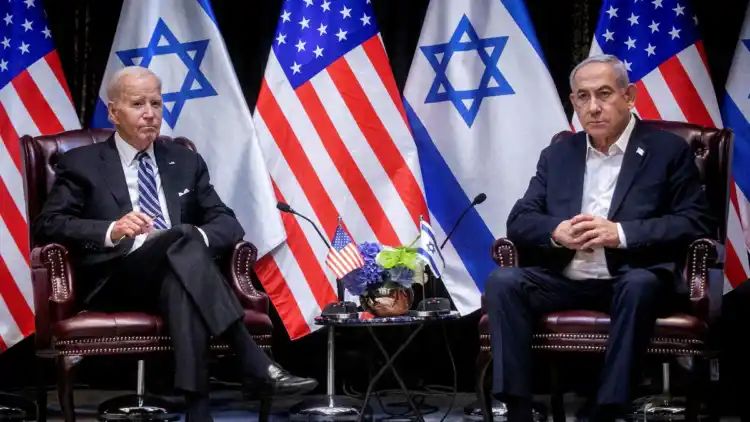In search of young voters? Biden flips on Netanyahu at UNSC, refuses to use veto power in favour of Israel

Israel’s Prime Minister Benjamin Netanyahu made the decision to cancel a scheduled trip to Washington by his top aides for discussions regarding aUS potential offensive in the Gaza city of Rafah.
This decision followed the United States’ not using its veto power to block a United Nations Security Council (UNSC) resolution, backed by Russia and China, calling for a ceasefire without linking it to the release of hostages.
According to a statement from the Prime Minister’s Office, Israel criticised the US decision, stating that it was detrimental to the war effort against Hamas and undermined efforts to secure the release of hostages. The statement described the US move as a departure from its consistent position in the Security Council and expressed concern that it could embolden Hamas to seek a ceasefire without releasing the hostages.
In response, US National Security Council spokesman John Kirby expressed disappointment at Israel’s decision to cancel the trip, emphasising the importance of engaging in dialogue to explore alternatives to a ground operation in Rafah. Kirby reiterated that the US abstention from the vote did not represent a shift in policy and emphasised the need for a ceasefire as part of a hostage deal.
It is important to note that it is an election year in USA and decisions of Biden administration could be influenced by several factors. Donald Trump is currently leading all the major polls after winning Republican primaries and on the other hand Biden is losing support of even the young voters, who helped him to win the elections in 2020.
Over the past two months, young voters have been inundated with images of conflict and devastation emerging from Gaza, both in news reports and on social media platforms. They’ve witnessed the death toll surpassing 20,000 Palestinians, as reported by Gaza’s health ministry, amid ongoing clashes. Concurrently, they’ve observed President Biden publicly supporting Israel’s declared mission to dismantle Hamas following attacks that resulted in the deaths of 1,200 individuals in Israel on October 7. Hamas continues to hold approximately 100 hostages in Gaza.
Recent polling data from a New York Times/Siena survey indicates that registered voters aged 18-29 are more inclined to support the Palestinian cause over Israel. This sentiment is reflected in their critical views of Israel’s actions and its military campaign against Hamas. Conversely, older generations tend to hold more favourable opinions of Israel.
Despite an overall disapproval rate of 57% among registered voters towards President Biden’s handling of the conflict, it is particularly noteworthy that young voters express the strongest objections. The Times/Siena poll reveals that a significant 72% of voters aged 18-29 disapprove of President Biden’s efforts in managing the situation.
The United States has historically provided significant political support to Israel, frequently exercising its veto power at the United Nations Security Council. Out of a total of 83 instances where the US has used its veto power, 42 were used to block resolutions condemning Israel. Between 1991 and 2011, of the 24 vetoes cast by the United States, 15 were specifically employed to shield Israel from censure. However this time, US and Biden administration has not backed Israel and allowed the resolution to pass.
The UN Security Council resolution passed on Monday demanded an immediate ceasefire between Israel and Hamas in Gaza and the unconditional release of all hostages, without making the former contingent on the latter. The US abstention allowed the ceasefire demand to pass, marking the first such resolution since the start of the conflict.
While France welcomed the resolution, Israel’s Ambassador to the UN criticised the Security Council for what he perceived as prioritising a ceasefire over the release of hostages. Defense Minister Yoav Gallant labeled the resolution as “scandalous” and reiterated Israel’s commitment to continuing the fight until all hostages are returned.
The resolution’s passage came amid escalating tensions between Netanyahu and the Biden administration over a potential ground operation in Rafah. Biden had urged Netanyahu to explore alternatives to a ground incursion, prompting the planned trip by Israeli officials to Washington to discuss US proposals.
The ongoing conflict in Gaza has resulted in significant casualties and humanitarian crises, with thousands killed and millions facing food insecurity. The resolution underscored the urgent need for a ceasefire and increased humanitarian assistance to the region.
Despite the resolution’s passage, Israel remained determined to achieve its objectives in Gaza, including the return of hostages and the dismantling of Hamas. The cancellation of the planned trip to Washington underscored the escalating tensions between Israel and its key ally, the United States, over the handling of the Gaza conflict.





